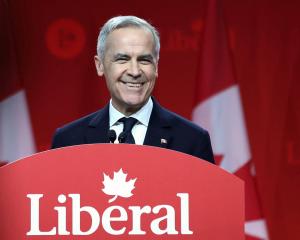This weekend in New York, New Zealand and other countries have an opportunity to really walk the climate-change talk.
Until now, this country has arguably only paid lip service to the issue.
For a country with an environmentally friendly, clean green global "brand'', we have been accused of dragging the chain, while the overwhelming evidence of global warming has mounted and the need for action become increasingly urgent.
Many argue we could - and should - have been a world leader on the issue.
But our legacy suggests something less notable.
We started well, but ditched our second-round Kyoto Protocol commitments, steadfastly refuse to bring in our biggest polluter, agriculture, to our emissions trading scheme, and have continued to binge on carbon credits to offset rather than reduce our emissions.
We recently appointed a climate-change minister with a self-confessed zero knowledge of the field, and who has made disparaging remarks about environmentalists, and when our prime minister took to the world stage to preach to other countries about global obligations, he was tarred with the embarrassing label of "fossil of the day'' for continuing to subsidise fossil-fuel production in New Zealand.
To top it off, we rank 42nd (our performance deemed "poor'', and near the bottom of OECD countries) out of the 58 countries listed in the Climate Change Performance Index, which assesses climate policies and measures emission levels per capita, emissions projections, renewable energy, and the energy intensity of the economy.
It's hardly full speed ahead in the electric car.
This weekend then, provides New Zealand with a chance to shine - or at least not lurk in the shadows.
Ms Bennett will be in New York, along with more than 150 governments, including 40 heads of state, to officially ratify the global accord nutted out in Paris at the end of last year.
If at least 55 countries representing at least 55% of global emissions sign, the agreement will be ratified and those countries' obligations begin.
The Paris agreement was a landmark one, some 20 years in the making, uniting the world's 196 countries, which pledged to reduce global fossil-fuel use and rising greenhouse gas emissions that contribute to global warming, and to keep warming below 1.5degC of pre-industrial levels (rather than the initial target of 2degC, the threshold beyond which scientists say global warming is likely to become catastrophic and irreversible).
But we are still walking on thin ice.
The world is already 1degC warmer than pre-industrial temperatures.
And the pledges made in Paris weren't actually enough to keep the world even within the 2degC threshold.
And, according to the Climate Change Performance Index, no country yet receives a "very good'' ranking, deemed to be doing enough to prevent dangerous climate change.
Real political will to drive us forward is required - and has finally been shown by leaders of some of the biggest emitters, the US, the EU and China.
Even India has indicated it will ratify the agreement in New York.
But at home, funding science and technology, implementing meaningful policies, stepping up efforts in the energy and transport sectors, and finding a way to bring about the desired changes in our agricultural emissions are essential.
There has been some movement of late. Ms Bennett has said the "two for one'' deal - whereby big industrial emitters of greenhouse gases will lose their right under the ETS to offset only half of their emissions - will end.
And our last two coal-fired electricity generators at Huntly Power Station are due to be shut down in December 2018.
But a change of attitude is needed to spur greater action, too.
For every month brings more record-breaking temperature increases around the world, more dramatic weather events, further reduction of the polar ice caps.
The world's political leaders need to look beyond winning their next election cycle if they truly intend to safeguard our future.












